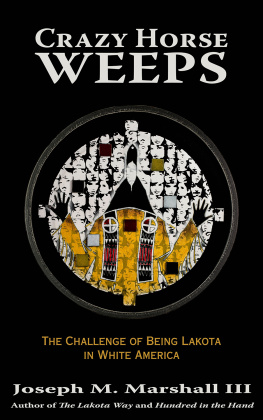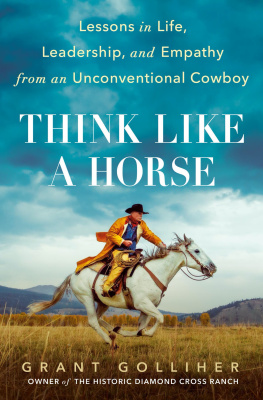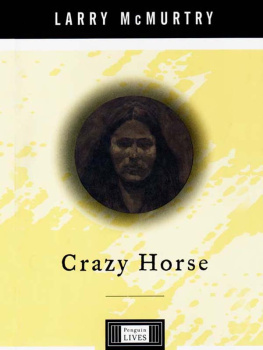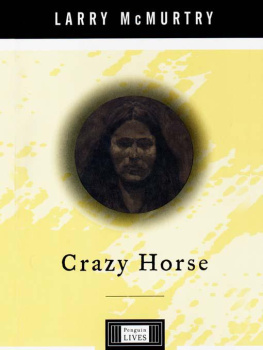Joseph M. Marshall - The Power of Four: Leadership Lessons of Crazy Horse
Here you can read online Joseph M. Marshall - The Power of Four: Leadership Lessons of Crazy Horse full text of the book (entire story) in english for free. Download pdf and epub, get meaning, cover and reviews about this ebook. year: 2009, genre: Romance novel. Description of the work, (preface) as well as reviews are available. Best literature library LitArk.com created for fans of good reading and offers a wide selection of genres:
Romance novel
Science fiction
Adventure
Detective
Science
History
Home and family
Prose
Art
Politics
Computer
Non-fiction
Religion
Business
Children
Humor
Choose a favorite category and find really read worthwhile books. Enjoy immersion in the world of imagination, feel the emotions of the characters or learn something new for yourself, make an fascinating discovery.

- Book:The Power of Four: Leadership Lessons of Crazy Horse
- Author:
- Genre:
- Year:2009
- Rating:3 / 5
- Favourites:Add to favourites
- Your mark:
- 60
- 1
- 2
- 3
- 4
- 5
The Power of Four: Leadership Lessons of Crazy Horse: summary, description and annotation
We offer to read an annotation, description, summary or preface (depends on what the author of the book "The Power of Four: Leadership Lessons of Crazy Horse" wrote himself). If you haven't found the necessary information about the book — write in the comments, we will try to find it.
The Power of Four: Leadership Lessons of Crazy Horse — read online for free the complete book (whole text) full work
Below is the text of the book, divided by pages. System saving the place of the last page read, allows you to conveniently read the book "The Power of Four: Leadership Lessons of Crazy Horse" online for free, without having to search again every time where you left off. Put a bookmark, and you can go to the page where you finished reading at any time.
Font size:
Interval:
Bookmark:


ALSO BY JOSEPH M. MARSHALL III
Keep Going
Soldiers Falling into Camp: The Battles at the Rosebud
and the Little Big Horn (co-author)
Winter of the Holy Iron
On Behalf of the Wolf and the First Peoples
The Dance House: Stories from Redbud
The Lakota Way: Stories and Lessons for Living
The Journey of Crazy Horse: A Lakota History
How Not to Catch Fish: And Other Adventures of Iktomi
Walking with Grandfather: The Wisdom of Lakota Elders
LEADERSHIP LESSONS OF
CRAZY HORSE

Joseph M. Marshall III

New york / London
www.sterlingpublishing.com
STERLING and the distinctive Sterling logo are registered trademarks of Sterling Publishing Co., Inc.
Library of Congress Cataloging-in-Publication Data Available
10 9 8 7 6 5 4 3 2 1
Published by Sterling Publishing Co., Inc.
387 Park Avenue South, New York, NY 10016
2009 by Joseph M. Marshall III
Distributed in Canada by Sterling Publishing
c/o Canadian Manda Group, 165 Dufferin Street
Toronto, Ontario, Canada M6K 3H6
Distributed in the United Kingdom by GMC Distribution Services
Castle Place, 166 High Street, Lewes, East Sussex, England BN7 1XU
Distributed in Australia by Capricorn Link (Australia) Pty. Ltd.
P.O. Box 704, Windsor, NSW 2756, Australia
Manufactured in the United States of America
All rights reserved
Sterling ISBN 978-1-4027-4881-3
For information about custom editions, special sales, premium and corporate purchases, please contact Sterling Special Sales Department at 800-805-5489 or specialsales@sterlingpublishing.com.


| INTRODUCTION: WHAT IS A LEADER? |  |
Does having a position of authority automatically make someone a leader? The generally accepted answer to this question seems to be yes . What about passionate or persistent espousal of a causedoes that make someone a leader? Sure , we say, often buying into someones authority based on the volume of their rhetoric. Yet, according to most dictionaries, the true definition of a leader is one who leads by influence.
Perhaps most of us are too busy just trying to survive and make a living to focus much attention on how our society functions. To be sure, people in authority will and do have an impact on our everyday lives. The actions and decisions of mayors, board chairmen, governors, chief executives, city council members, state legislators, and members of Congress affect most if not all of us in one way or another. These people may think of themselves as leaders because of the titles they hold or the authority vested in them, while we ordinary citizens accept them as leaders for no other reason than the jobs they have.
Too often we give people our trust without really knowing what does, or does not, qualify them for the positions they hold. We forget that anyone who runs for public office at any level is, first, a politician . Politicians may learn how to get themselves elected, but can they learn how to lead? Similarly, we forget that most people who occupy high-level corporate positions are there to serve the bottom line, for themselves and for the company. Witness the benefits reportedly given to corporate CEOs and the like, who seem to be more lucratively rewarded for not doing their jobs than they are for doing them. Corporate executives know how to make money, or be rewarded for failing do so, but they are not necessarily leaders.
So that demands the question: Can mayors, CEOs, senators, board chairmen, and the like be leaders? Of course they can, but they must rise above themselves and the positions they hold. The fact of the matter, however, is that many of them do not rise above, because people in authority tend to spend much time and effort working to keep their jobs. And they often fail to realize that there is a difference between the appearance and the reality of being a leader.
The word leader is often applied too freely. When we confer that label offhandedly, we forget that leadership cannot be mandated by a job description. True leadership is only possible when character is more important than authorityespecially the authority to compel or control the actions of others. It is character, and not position, that can turn administrators, directors, supervisors, and even senators, congressmen, governors, and presidents into leaders.
In every society or culture throughout history, people from every walk of life and in every endeavorgood or bad, legal or illegal, moral or immoral, harmful or helpfulhave undoubtedly influenced others to do something they may not have done on their own. Does this mean that we should consider Genghis Khan, Adolf Hitler, Mao Tse-tung, Attila the Hun, Ho Chi Minh, or Benito Mussolini to be effective leaders? After all, those men did convince people of the righteousness or necessity of their causes and influence them to follow. It is said that Adolf Hitler led the German peoplemeaning that they followed willingly on the path of fascism that caused so much death and destruction. Genghis Khan was intent on conquering the world, and nearly did, killing hundreds of thousands of people in the process. Mao Tse-tung, we are told, led millions and millions of his countrymen through a cultural revolution that brought China into the modern world. But we are only now learning of the unspeakable atrocities he caused to be committed against his own people, not so much in the name of change but to maintain his own authority.
Defined broadly, it seems that leaders can be villains as well as heroes, considering the fact that both are able to influence, manipulate, or coerce enough people to follow them that the consequences of their leadership extend far beyond themselves. We must not overlook the fact that any instrument, process, idea, or method that is used to accomplish good can also be used for dark or destructive purposes. Of course, it is also important to remember that a willing follower has just as much of a choice as a leader, and therefore bears the same responsibility. We can only imagine what would have happened, or not happened, had Hitlers words fallen on deaf ears. The lesson here is that in order for societies, cultures, and nations to function and thrive, we must all aid and abet leadership on the side of morality, fairness, equality, and justice. To that end we must demand not so much that our leaders be more than we are as ordinary people, but that they epitomize and apply the best that we are as individuals, nations, societies, and cultures. We have the right to good, ethical, moral, dynamic, and even inspirational leadership. More importantly, we need it.
Font size:
Interval:
Bookmark:
Similar books «The Power of Four: Leadership Lessons of Crazy Horse»
Look at similar books to The Power of Four: Leadership Lessons of Crazy Horse. We have selected literature similar in name and meaning in the hope of providing readers with more options to find new, interesting, not yet read works.
Discussion, reviews of the book The Power of Four: Leadership Lessons of Crazy Horse and just readers' own opinions. Leave your comments, write what you think about the work, its meaning or the main characters. Specify what exactly you liked and what you didn't like, and why you think so.








